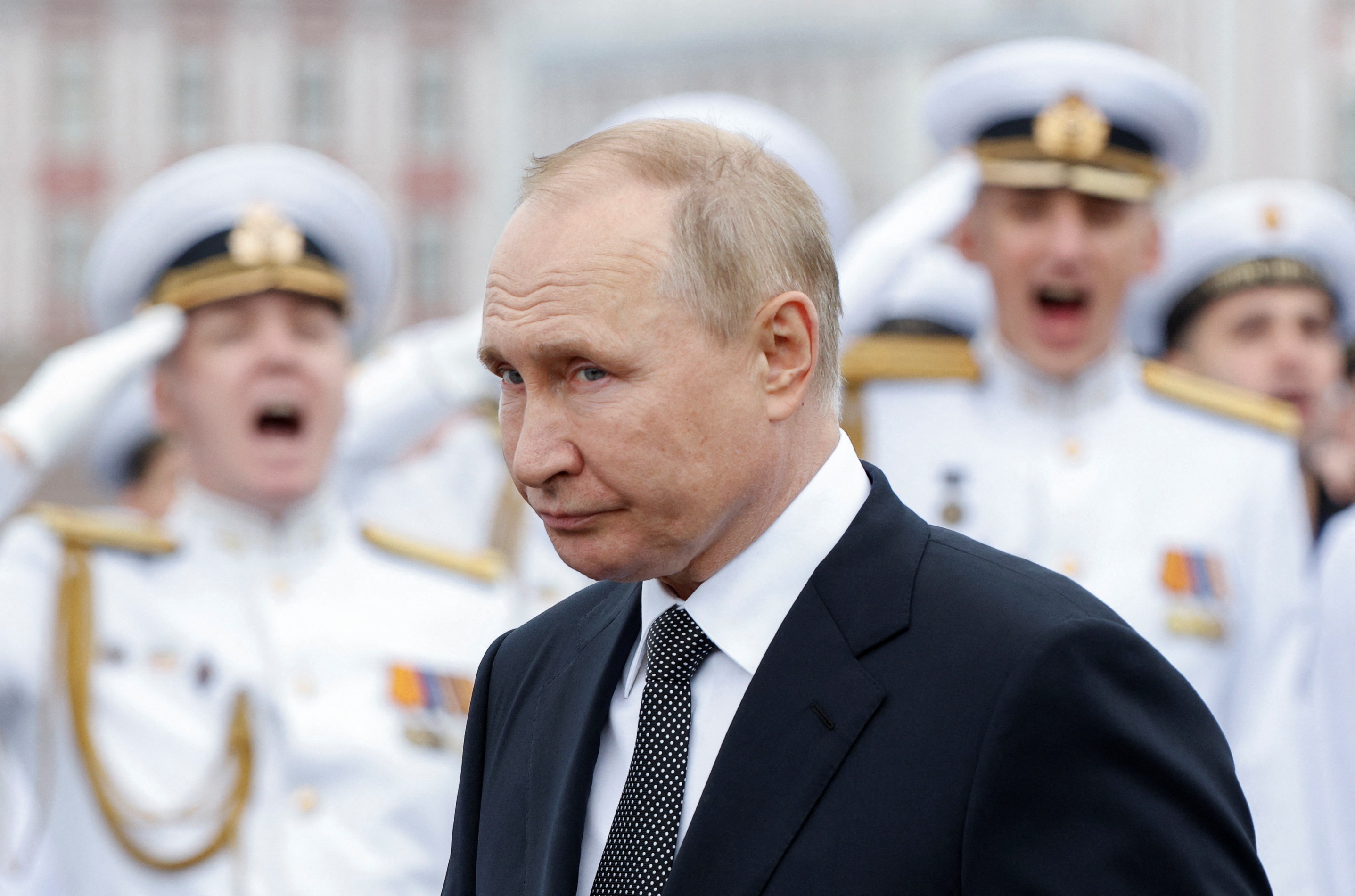
Russia's President Vladimir Putin attends a parade marking Navy Day in Saint Petersburg, Russia July 31, 2022. REUTERS/Maxim Shemetov
22-02-2023 at 4 PM Aden Time
Andrew Korybko (South24)
Russia is in the midst of what many describe as a New Cold War with the West that’s being fought over the direction of the global systemic transition. The first wants to continue its evolution towards multipolarity while the second wants to retain the trappings of US-led unipolarity. The competition between them over the future of international relations reached a tipping point with the Ukrainian Conflict, which can be regarded as NATO-Russian proxy war after all that unfolded over the past year.
The struggle between Russia and the West has affected every corner of the world. Despite developing countries being split in their position towards the Ukrainian Conflict at the United Nations General Assembly, with some voting against Moscow while others remained neutral, none of them joined the West’s anti-Russian sanctions. Furthermore, the resultant food and fuel crises affects all developing countries, and some like those in West Africa are also the scene of fierce proxy competition right now.
The impression that casual observers are left with is that the New Cold War between Russia and the West has supposedly placed those two on separate sides in every conflict across the world as they jockey with one another for influence. For as compellingly as that description might appear to explain contemporary military, political, and strategic dynamics, especially among developing countries, it’s proven to be imperfect by the example of Yemen.
Russia is conspicuously neutral towards that eight-year-long conflict, which contradicts the aforementioned explanation that it would have already supposedly picked a side by now. The reality is that while the Kremlin supports the request that Yemen’s UN-recognized government made in 2015 for military assistance from the Saudi-led Coalition and respects that country’s territorial integrity, it still retains pragmatic ties with the Houthis and the Southern Transitional Council (STC).
What’s interesting about all three parties to the Yemeni Conflict is that they’re each considered to be backed by a separate foreign partner. Yemen’s UN-recognized government, for instance, is widely regarded as mostly being supported by Saudi Arabia. Meanwhile, the Houthis are thought to be backed by Iran while similar perceptions exist regarding the STC’s relationship with the UAE. All three external parties to the conflict also curiously happen to be close Russian partners nowadays too.
Even prior to the start of the [Russian-Ukrainian conflict], which Moscow claims is supposed to defend its national security red lines there after NATO clandestinely crossed them but which Kiev and its Western partners describe as an unprovoked invasion, the Kremlin was cultivating balanced ties with all of them. Its grand strategy for a Greater Eurasian Partnership, which is what it’s officially been called for several years already, prioritizes the development of relations with non-traditional partners.
The purpose in reaching out to countries like Saudi Arabia, Iran, and the UAE is to diversify from Russia’s hitherto disproportionate dependence on its traditional partners like erstwhile Saddam-era Iraq, all with a view towards facilitating the comprehensive integration of Eurasia via economic means. Through a combination of agricultural, economic, energy, financial, military, political, tourism, and trade ties, Russia achieved strategic successes in this respect over the past half-decade.
By pure coincidence, that period during which it seriously prioritized the comprehensive development of its relations with non-traditional partners like Saudi Arabia, Iran, and the UAE overlapped with the Yemeni Conflict. Since all three external parties are considered by Moscow to be backing different armed sides, notwithstanding the STC’s alliance with Yemen’s UN-recognized government, the Kremlin felt uncomfortable favoring any of them due to the risk of worsening relations with the other two.
In such a situation, the complex dynamics of which continue into the present, it thus makes the most sense for Russia to practice a policy of neutrality towards the Yemeni Conflict whereby it reaffirms its commitment to the principles enshrined in the UN Charter while still maintaining ties with all parties. Over the past year, Russia’s non-traditional Saudi, Iranian, and UAE partners each came to play a greater role in its grand strategy after the West’s sanctions, thus ensuring this stance’s perpetuation.
All three of them play complementary roles as pressure valves for Moscow from those aforesaid unilateral sanctions that were imposed outside the purview of the United Nations Security Council and are thus considered illegitimate in terms of international law. If Russia already calculated prior to the commencement of the [Russian-Ukrainian conflict] last year that each of them were too important to risk worsening ties with, then that’s even much more the case nowadays than before.
Recalling the question raised earlier in this analysis regarding the reason for Russia’s neutrality towards the Yemeni Conflict, it can thus be answered by emphasizing the outsized importance that each conflicting party’s external partners play for the Kremlin’s grand strategy. To simplify, the UN-recognized Yemeni government’s Saudi one is crucial for energy coordination, the Houthi’s Iranian partner is a valuable military lifeline, while the STC’s UAE one is key for facilitating foreign financial transactions.
Each of these factors were significant in their own right prior to the New Cold War reaching a new phase after the start of the [Russian-Ukrainian conflict], but they all became much more influential in terms of reinforcing the Kremlin’s stance towards the Yemeni Conflict since then. This arguably being the case, it’s therefore expected that Moscow will retain its existing position, won’t choose favorites or meddle, and can thus be considered a credible party for possibly mediating a political solution to the war.
Moscow-based American political analyst
- Opinions expressed in this analysis reflects its author and doesn't represent the center's views